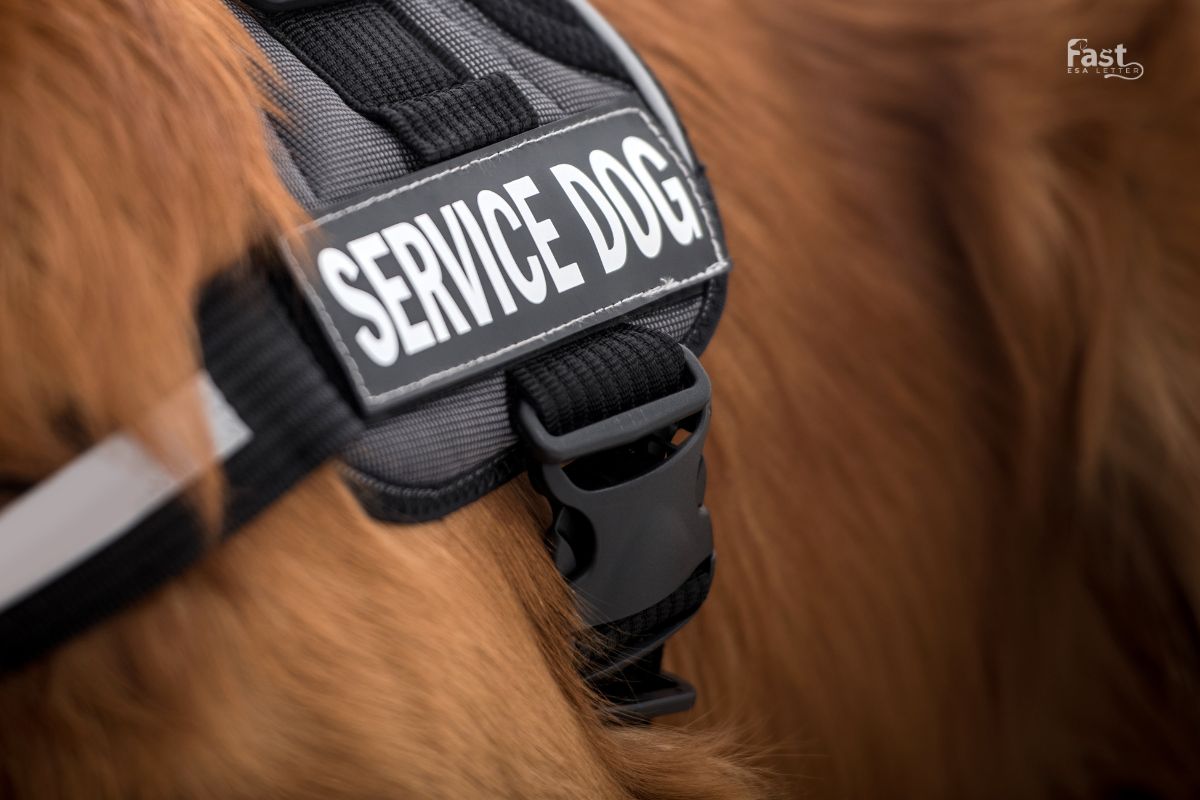How to Get a Service Dog for ADHD in 2025?To get a service dog for ADHD in 2025, you need a formal diagnosis of ADHD and a recommendation from a licensed mental health professional. The dog must be individually trained to perform tasks that mitigate...
What is a Service Animal?
Your Pet Deserves a Home!
An ESA Letter makes it possible.
A service animal is a specially trained animal that helps individuals with disabilities perform tasks they cannot do on their own. These animals are vital in assisting people with a range of physical and mental conditions. The service animal requirements include the animal being trained to perform specific tasks related to the person’s disability. Service animals are typically dogs but can also include miniature horses in certain situations.

Benefits of Having a Service Animal
- Physical Assistance
- Emotional Support
- Improved Quality of Life
- Increased Independence
Types of Service Dogs
- Guide Dogs: These dogs assist individuals who are visually impaired or blind, helping them navigate safely in various environments.
- Hearing Dogs: Trained to alert individuals who are deaf or hard of hearing to important sounds, such as doorbells, alarms, or a baby’s cry.
- Mobility Assistance Dogs: Help individuals with physical disabilities perform tasks such as retrieving objects, opening doors, or assisting with balance.
- Psychiatric Service Dogs (PSDs): Psychiatric Service dogs are specifically trained to help individuals with mental health conditions like PTSD, anxiety, and depression. They provide both emotional support and perform tasks to help manage symptoms.
- Seizure Response Dogs: Trained to assist people with epilepsy or seizure disorders by alerting others or providing physical support during or after a seizure.
Best Service Dogs Breeds
Several dog breeds are known for their intelligence, temperament, and ability to meet service animal requirements. Here are five breeds commonly used for service work:
- Labrador Retriever:
- Friendly and eager to please
- Highly trainable
- Golden Retriever:
- Gentle, calm, and patient
- Known for their loyalty and willingness to work.
- Poodle:
- Extremely intelligent and adaptable
- Hypoallergenic breed
- German Shepherd:
- Loyal, protective, and highly intelligent
- Naturally alert and responsive
- Boxer:
- Energetic
- Affectionate, and very trainable.
Service Animal Laws and ADA Regulations
- ADA Protection: The Americans with Disabilities Act (ADA) ensures that individuals with disabilities can bring their service animals into most public places and housing, even if the facility has a no-pets policy. This includes restaurants, stores, hotels, and public transportation.
- Housing Rights: Under the Fair Housing Act, landlords cannot deny a service animal or charge a pet fee for one. However, they can ask for service animal documentation if necessary, such as proof of the animal’s training or the handler’s disability.
- Air Carrier Access Act (ACAA): The Air Carrier Access Act ensures that passengers with disabilities can travel with their service animals on airlines. The ACAA protects the right to bring service animals on flights and allows airlines to request certain service animal documentation. This includes verifying that the animal is trained and healthy enough to fly.
Service Animals vs. Emotional Support Animals (ESAs)
| Category | Service Animal | Emotional Support Animal (ESA) |
|---|---|---|
| Definition | A service animal is a trained animal that performs specific tasks to assist an individual with a disability. | An emotional support animal (ESA) provides comfort and emotional support, but is not trained for specific tasks. |
| Training | Service animals are extensively trained to perform tasks related to the handler’s disability. | ESAs are not trained to perform tasks and only offer companionship. |
| Rights | Protected under the ADA, FHA, and ACAA allowing access to public spaces, housing, and travel. | Protected under the Fair Housing Act, but not guaranteed public access. |
| Common Tasks | Includes tasks like guiding, alerting, retrieving items, or providing physical assistance. | ESAs provide comfort, but do not perform specific tasks related to the disability. |
Training and Requirements for Service Animals
Service animal training is crucial to ensuring the animal can perform tasks and behave appropriately in public spaces. Training typically involves obedience training, task-specific training, and public access training to ensure the animal can behave well in various settings.
Service animals in training must meet specific service animal requirements, which include being able to navigate public spaces without causing disruptions. Psychiatric service animals (PSDs) may require specialized training to address mental health conditions like anxiety or PTSD.
How to Get a Service Animal
To get a service animal, start by assessing your needs to determine which tasks the animal will assist with due to your disability. Consult a healthcare professional who can confirm if a service animal would benefit you. Service animals require specialized training, which you can arrange through a professional trainer or, in some cases, do yourself.
Be sure to understand ADA laws, as service animals are legally allowed access to public spaces and housing without extra fees. Ongoing training and consistent care will ensure your service animal remains effective in supporting you.
Frequently Asked Questions (FAQs)
Can Your Landlord Charge A Pet Fee For A Service Animal?
How Much is a Service Dog?
How Do You Certify A Service Animal?
What Are The Requirements For A Service Animal?
Can A Landlord Deny A Service Animal?
How Can I Register My Pet As A Service Dog?
While there is no official national registry, registering a pet as a service dog often involves proving that the animal meets the training standards and provides specific assistance to the handler’s disability.
Can A Service Animal Fly With Me?
Are Service Animals Allowed On International Flights?
Can I Bring My Service Dog To Work?
Do Service Animals Need To Wear A Vest?
While not required by law, many service animals wear a service animal vest to identify them as working animals. This can help in public spaces, as it signals that the animal is there to assist their handler and not as a pet.
Related Articles
How to Get a Service Dog for Anxiety in 2025?
To get a service dog for anxiety, start by obtaining a formal diagnosis from a licensed mental health professional. These dogs are trained to detect and interrupt anxiety symptoms, providing reliable, daily assistance.
Can a Chihuahua Be a Service Dog?
Can a Chihuahua Be a Service Dog? Chihuahuas can be great service dogs if trained to perform specific tasks that assist individuals with disabilities. They excel in medical alert, psychiatric assistance, and hearing impairment support. Their small...


